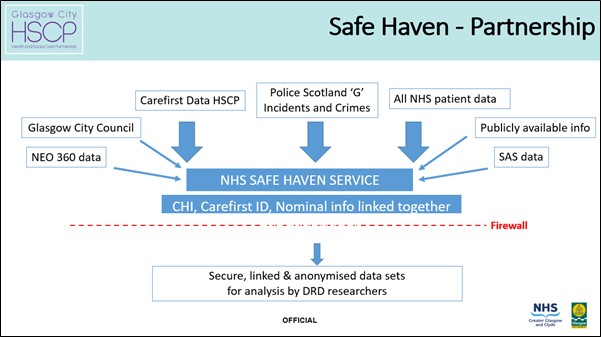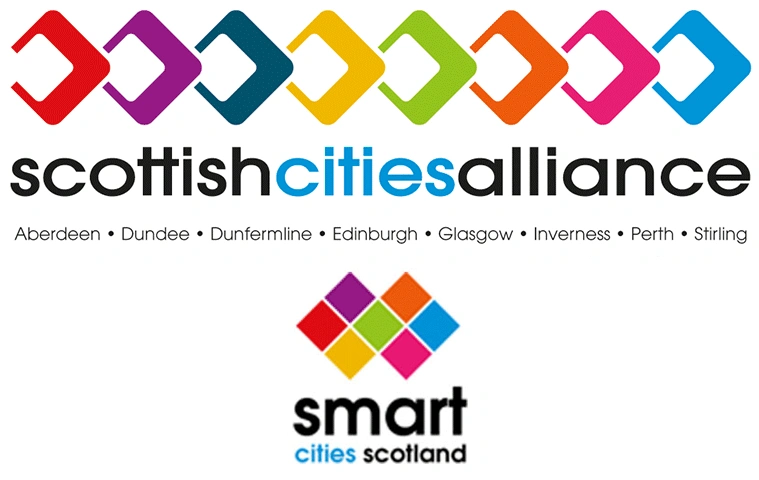Case Study: Glasgow Alcohol & Drug Partnership (ADP) Data Sharing Solution
April 4, 2023Project Overview
The ERDF 8th City Data Analytics activity addresses city challenges through data driven decision making, combining design, data and innovation to come up with new solutions. The team aim to enhance outcomes for citizens by generating new insights and improving the efficiency and effectiveness of our services through the better use of data driven decision making.
Delivery of the ADP Data Sharing Solution project had several distinct stages, including:
- An initial focus on getting agencies to share data on specific groups of vulnerable people affected by addictions – this included Police, Ambulance Service, NHS and Health & Social Care. Agreement was sought around the security and privacy of the data being shared.
- A research ‘safe haven’ was established via the University of Glasgow and the NHS to manage the shared data in a way so that it could be used for practical purposes but ensuring all safeguards were in place to maintain the security and privacy of the data.
- The ADP team had to articulate the challenges they wanted the work to address and the questions they wanted answered.
- The data had to be anonymised and linked for use by the project team.
- The linked data was integrated into ‘Arc GIS’ mapping software and then visualized using dashboard and mapping capabilities – this enabled the project team to query the data and return highly visual insights.
- To test the application of the approach, a specific group of vulnerable clients was selected to become the initial focus for the work. This became the cohort around which the project team was able to link the data and generate analyses. The outputs were fed to ADP staff who then used this to challenge assumptions around support services currently being offered to them.
- Microsoft ‘Power BI’ was used to enhance further the data visualisations.
- Exploration around how to make the data accessible to ADP professionals in a way that is both practical and meaningful whilst safeguarding privacy.
Why is this Needed?
Glasgow has recorded very high levels of drug deaths over the past few years, a fact exacerbated by the challenges of providing support services for the most vulnerable during covid. This has placed an increased strain on agencies tasked with trying to address alcohol and drug addictions in Glasgow.
Whilst there is close working between agencies, the level of detailed data sharing and analyses across agencies has been an on-going issue. The Glasgow Alcohol & Drug Partnership (ADP) approached the Council Data team (part-funded via ERDF) to ask whether it could facilitate greater data sharing and generate new insights around addictions issues through the use of data analytics and shared data.
The solution was to make use of an NHS research data ‘Safe-Haven’ to share securely and anonymously sensitive data from the NHS, Police, Ambulance Service and Health & Social Care Partnership, join this together to create a more wholistic view of specific vulnerable groups and then integrate the data into visualisation software.
Safe Havens provide a secure platform for the use of NHS electronic data in research projects and can also include access to other sources of data. Safe Havens exist across Glasgow, Edinburgh, Aberdeen and Dundee as well as nationally via Public Health Scotland. Data are subject to a robust governance framework whilst being accessed via Safe Havens.

Figure 1: Model of data sharing – Safe Haven Partnership
Impact and Benefits
The outcome of this project was that new insights are now available instantly via a dashboard platform – these insights can be adapted and provided to operational staff and policy makers involved in trying to provide support services to those affected by alcohol and drug addiction issues in the city. This is the first phase of a longer-term commitment to improve data and intelligence access.
Tangible results from the project include:
- Access to data that wasn’t previously available around ADP client groups and also analyses produced far quicker than previous.
- The insights feed directly into policy making and service development so that there is a strengthened foundation of data driven decision making across the work of the ADP.
- Access to far more data is either confirming or challenging assumptions held by staff around how and when to intervene.
- The project can help quantify issues that professionals have previously had more anecdotal knowledge of.
- The project phase has created a blueprint or methodological approach that can be followed or improved on by other ADPs across Scotland, or indeed within the Glasgow ADP when examining other vulnerable target groups; and
- The project proves that sensitive data sharing is possible and also provides an inspiration for other types of data sharing.
The project delivered to date (March 2022) represents the completion of the first stage of a longer-term development to improve access to data and insights to policy makers and practitioners. Some key steps that need to be taken to progress the work include:
- Continue to secure the opening up of more of the agreed and relevant data, and expand out to include other agencies.
- Work to open up practical access to analytical tools by ADP professionals.
- Test and evaluate the line of sight between the data insights and any new policies and actions that positively impact on the vulnerable client groups.
- Once, validated, shift the focus of the approach to other vulnerable client groups.
- Create a blueprint for data sharing and analyses of other sensitive data types.
- Create a blueprint from the project for other ADPs to examine.
- Create a compelling story around the impact and potential of the approach.
Further Information
Stephen Sprott, Data and Innovation Project Manager
Strategic Information, Innovation & Technology, Glasgow City Council
